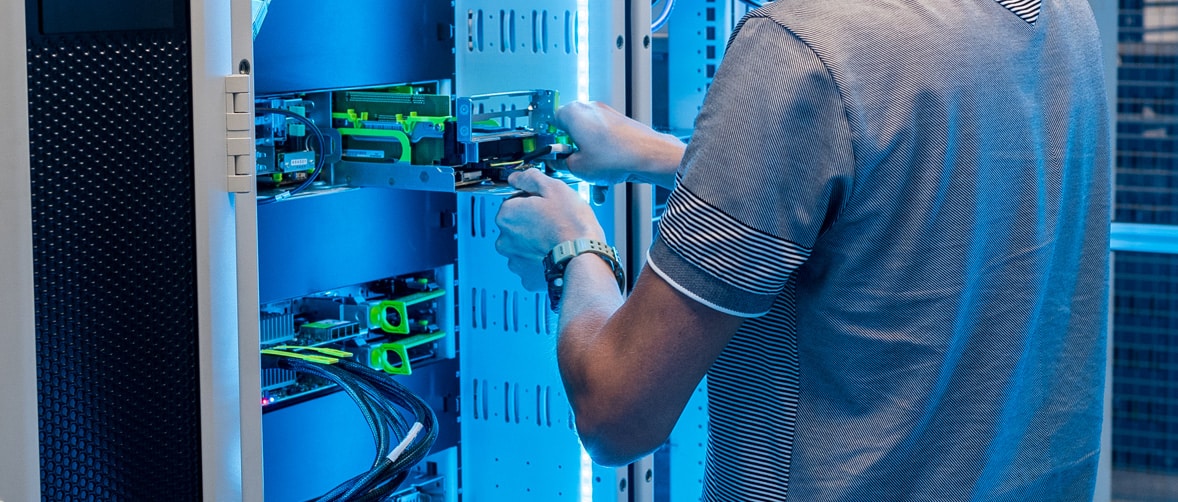In our previous blog on the involvement of maincubes in the Open Compute Project, we discussed the benefits of using OCP hardware. Flexibility is one of them. But why? How does using open-source hardware help you as a hosting company, an enterprise IT department, a SaaS provider, or a system integrator to become dramatically more flexible?
Just 8 rack configurations
The reason is simple: because using OCP technology helps you to turn your racks into a commodity item based on completely standardized hardware.
Let me explain. In legacy environments, no two racks are the same. In traditional cabinets, there is always a wide variety of specialized equipment. Think of servers, but also a mix of NAS, SAN’s, switches, routers, load balancers, firewalls, and lots and lots of other dedicated equipment.
Now let’s have a look at OCP racks. They always look remarkably identical. All we see is lots and lots of OCP servers. Did you know that Facebook – with its millions and millions of systems installed one of the largest OCP users in the world – uses just 8 different rack configurations? Yes, you read that correctly: only 8.
One hardware platform
So how do they do that? And how does that help you as a hosting company or service provider as well?
In the world of Open Compute, almost anything we do is based on just one hardware platform: the OCP server. What role each server plays within the overall IT infrastructure depends on the open-source software that is installed on each system. So that the same OCP server can become a switch, a firewall, or a database server, it is the software that is installed on the server that determines its specific function or role. That dramatically increases your flexibility!
Virtual services up in minutes
Now let’s say that you, as a hosting company or a service provider, have a customer that needs an additional firewall. In the legacy world, that would require ordering and installing another extra firewall box.
Not so when it comes to an OCP infrastructure. Because in an OCP environment, you will simply fire up a new Linux container in which you install – using open source Network Function Virtualization (NFV) software – a virtual firewall. And this Linux container is then deployed onto one of the standard OCP servers you already have available in your racks.
While ordering and installing a traditional firewall might take days or weeks. This virtual firewall is up and running in minutes. That means you can offer (and start charging for!) that extra service to your customer almost immediately. And if your customer no longer needs this extra piece of security equipment, all you need to do is simply delete the container.
So OCP allows you to use economies of scale to increase your flexibility dramatically. You will be able to quickly help your customers when they need a new service – even if they only require that it for just a few weeks.
Multi-skilled people
But there is more.
Let’s have a look at people. The number of operational staff that is needed to keep an OCP data center running is dramatically less than in traditional environments. Because of all the different hardware systems that are being used in legacy racks, you often need one fulltime employee to manage just six racks. In the OCP world, most racks are identical and consist of almost 100% OCP servers. So one person can operate many more servers and racks. And because OCP servers have been designed with a keen eye on manageability, we now see OCP data centers where one person can manage up to 45.000 (!) servers.
But we are not done yet. In the Nordics, there is this OCP user where they like to call their operational data center staff ‘multi-skilled.’ Because the handful of people they employ in their data center can perform a wide variety of tasks: welcoming guests, changing servers, do basic power work, etc. And as they like to tell their audience during presentations jokingly: their employees are available to clear the parking lot of snow as well.
Economies of scale
So for you as a service provider or hosting company deploying OCP gear helps you to increase your flexibility dramatically. You reap the benefit of economies of scale because you can buy a large number of servers and turn them into switches, firewalls (and yes, servers as well), etc. using open-source software. And the operations staff in your data center? They maintain a data center that consists of a large number of identical systems. So within no time, they are very experienced in servicing those systems while they have time to do other jobs as well.
Want to know more?
In maincubes AMS01 in Amsterdam, we have a European OCP Experience Center available where you can learn more about OCP. Here we have engineers and partners available to help you design and test your OCP environment as well.
Antje Tauchmann, Head of Marketing bei maincubes
